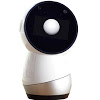
Marvin Lee Minsky was an American cognitive and computer scientist concerned largely with research of artificial intelligence (AI), co-founder of the Massachusetts Institute of Technology's AI laboratory, and author of several texts concerning AI and philosophy.

Kismet is a robot head which was made in the 1990s at Massachusetts Institute of Technology (MIT) by Dr. Cynthia Breazeal as an experiment in affective computing; a machine that can recognize and simulate emotions. The name Kismet comes from a Turkish word meaning "fate" or sometimes "luck".
Domo is an experimental robot made by the Massachusetts Institute of Technology designed to interact with humans. The brainchild of Jeff Weber and Aaron Edsinger, cofounders of Meka Robotics, its name comes from the Japanese phrase for "thank you very much", domo arigato, as well as the Styx song, "Mr. Roboto". The Domo project was originally funded by NASA, and has now been joined by Toyota in funding robot's development.
The Cyberflora project is a project developed by the Media Lab at Massachusetts Institute of Technology. The project is part of the Anima Machina program at MIT - a program that was developed by Assistant Professor of Media Arts and Sciences and Director of the Robotic Life Group Cynthia Breazeal. The Cyberflora project allowed Breazeal and students involved in the media lab to investigate emotional intelligence in a breed of robots that combines both plant and animal characteristics.

Rosalind Wright Picard is an American scholar and inventor who is Professor of Media Arts and Sciences at MIT, founder and director of the Affective Computing Research Group at the MIT Media Lab, and co-founder of the startups Affectiva and Empatica.
The following outline is provided as an overview of and topical guide to artificial intelligence:

Leonardo is a 2.5 foot social robot, the first created by the Personal Robots Group of the Massachusetts Institute of Technology. Its development is credited to Cynthia Breazeal. The body is by Stan Winston Studios, leaders in animatronics. Its body was completed in 2002. It was the most complex robot the studio had ever attempted as of 2001. Other contributors to the project include NevenVision, Inc., Toyota, NASA's Lyndon B. Johnson Space Center, and the Navy Research Lab. It was created to facilitate the study of human–robot interaction and collaboration. A DARPA Mobile Autonomous Robot Software (MARS) grant, Office of Naval Research Young Investigators Program grant, Digital Life, and Things that Think consortia have partially funded the project. The MIT Media Lab Robotic Life Group, who also studied Robonaut 1, set out to create a more sophisticated social-robot in Leonardo. They gave Leonardo a different visual tracking system and programs based on infant psychology that they hope will make for better human-robot collaboration. One of the goals of the project was to make it possible for untrained humans to interact with and teach the robot much more quickly with fewer repetitions. Leonardo was awarded a spot in Wired Magazine’s 50 Best Robots Ever list in 2006.

Ayanna MacCalla Howard is an American roboticist, entrepreneur and educator currently serving as the dean of the College of Engineering at Ohio State University. Assuming the post in March 2021, Howard became the first woman to lead the Ohio State College of Engineering.

Daniela L. Rus is a roboticist and computer scientist, Director of the MIT Computer Science and Artificial Intelligence Laboratory (CSAIL), and the Andrew and Erna Viterbi Professor in the Department of Electrical Engineering and Computer Science (EECS) at the Massachusetts Institute of Technology.

Andrew Yan-Tak Ng is a British-American computer scientist and technology entrepreneur focusing on machine learning and artificial intelligence (AI). Ng was a cofounder and head of Google Brain and was the former Chief Scientist at Baidu, building the company's Artificial Intelligence Group into a team of several thousand people.
Machine ethics is a part of the ethics of artificial intelligence concerned with adding or ensuring moral behaviors of man-made machines that use artificial intelligence, otherwise known as artificial intelligent agents. Machine ethics differs from other ethical fields related to engineering and technology. Machine ethics should not be confused with computer ethics, which focuses on human use of computers. It should also be distinguished from the philosophy of technology, which concerns itself with the grander social effects of technology.
Radhika Nagpal is an Indian-American computer scientist and researcher in the fields of self-organising computer systems, biologically-inspired robotics, and biological multi-agent systems. She is the Augustine Professor in Engineering in the Departments of Mechanical and Aerospace Engineering and Computer Science at Princeton University. Formerly, she was the Fred Kavli Professor of Computer Science at Harvard University and the Harvard School of Engineering and Applied Sciences. In 2017, Nagpal co-founded a robotics company under the name of Root Robotics. This educational company works to create many different opportunities for those unable to code to learn how.

Mary-Anne Williams FTSE is the Michael J Crouch Chair for Innovation at the University of New South Wales in Sydney Australia (UNSW) based in the UNSW Business School.

Joy Adowaa Buolamwini is a Ghanaian-American-Canadian computer scientist and digital activist based at the MIT Media Lab. She founded the Algorithmic Justice League (AJL), an organization that works to challenge bias in decision-making software, using art, advocacy, and research to highlight the social implications and harms of artificial intelligence (AI).
Carol Elizabeth Reiley is an American business executive, computer scientist, and model. She is a pioneer in teleoperated and autonomous robot systems in surgery, space exploration, disaster rescue, and self-driving cars. Reiley has worked at Intuitive Surgical, Lockheed Martin, and General Electric. She co-founded, invested in, and was president of Drive.ai, and is now CEO of a healthcare startup, a creative advisor for the San Francisco Symphony, and a brand ambassador for Guerlain Cosmetics. She is a published children's book author, the first female engineer on the cover of MAKE magazine, and is ranked by Forbes, Inc, and Quartz as a leading entrepreneur and influential scientist.
Karen L. Myers is the director of SRI International's Artificial Intelligence Center, where she is also principal scientist.

Joëlle Pineau is a Canadian computer scientist and Associate Professor at McGill University. She is the global Vice President of Meta's Artificial Intelligence Research department, also known as FAIR, and is based in Montreal, Quebec.

Pieter Abbeel is a professor of electrical engineering and computer sciences, Director of the Berkeley Robot Learning Lab, and co-director of the Berkeley AI Research (BAIR) Lab at the University of California, Berkeley. He is also the co-founder of covariant.ai, a venture-funded start-up that aims to teach robots new, complex skills, and co-founder of Gradescope, an online grading system that has been implemented in over 500 universities nationwide. He is best known for his cutting-edge research in robotics and machine learning, particularly in deep reinforcement learning. In 2021, he joined AIX Ventures as an Investment Partner. AIX Ventures is a venture capital fund that invests in artificial intelligence startups.

Cynthia Diane Rudin is an American computer scientist and statistician specializing in machine learning and known for her work in interpretable machine learning. She is the director of the Interpretable Machine Learning Lab at Duke University, where she is a professor of computer science, electrical and computer engineering, statistical science, and biostatistics and bioinformatics. In 2022, she won the Squirrel AI Award for Artificial Intelligence for the Benefit of Humanity from the Association for the Advancement of Artificial Intelligence (AAAI) for her work on the importance of transparency for AI systems in high-risk domains.
Andrea L. Thomaz is a senior research scientist in the Department of Electrical and Computer Engineering at The University of Texas at Austin and Director of Socially Intelligent Machines Lab. She specializes in Human-Robot Interaction, Artificial Intelligence and Interactive Machine Learning.













